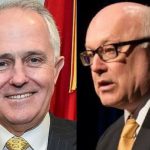Government Again Uses Threat of Terrorism to Justify Greater Control

State and territory leaders agreed this week to disclose driver licence photos to the federal government so it can create a national face-recognition database. At the COAG security meeting, the premiers also agreed to a set of new federal laws, which Prime Minister Malcolm Turnbull says are necessary in Australia’s fight against terrorism.
National database
Driver licence photos will be supplemented with passport photos to populate the federal government- run national database, which will enable biometric face-matching and be used by police and other law enforcement agencies to monitor individuals in public places.
Police around the country will be able to instantly access the database to cross-reference with both live and CCTV images of people. Border Force officer will also be able to access the information.
The government says it can currently take days to verify a person’s identity, but the new system will allow this to occur instantaneously.
National preventative detention orders
A new federal law will be introduced allowing suspects of terrorism to be detained up to 14 days without being charged.
Currently, NSW is the only state that has this law. Under NSW law Police don’t need to have evidence that a person has committed a crime or an act of terrorism, they only need to have a “reasonable suspicion” that the person has or will engage in a terrorism act, or that they have done something to plan or prepare for such an act.
These ‘preventative detention orders’ are now set to be rolled out nationally.
Prohibited material and hoaxes
States and territories also agreed to criminalise the possession of documents resembling ‘terror instruction manuals’, including bomb making and espionage guides.
Hoaxes have also come under the spotlight. While bomb and terrorism hoaxes are already criminalised throughout Australia, the government is set to introduce tougher penalties for these offences.
Big Brother is watching
Over the past few years, Australia has seen the introduction of a range of laws which have eroded our privacy, freedom of speech, freedom of association, freedom of movement and right against detention without evidence whilst giving police and other law enforcement agencies unprecedented powers and protections, including increased powers to monitor, arrest and prosecute people and immunity against both civil and criminal prosecution during raids which are said to be carried out due to a terrorism threat.
These laws have invariably been justified on the basis of the threat of terrorism or organised crime.
Examples include new metadata laws, which require Internet Service Providers to store personal data for two years and release it to a range of government agencies without the need for a warrant. These laws have already been repeatedly misused by police and a number of government agencies, including local councils for trivial purposes for which they were not intended.
Laws allow the government to prosecute ‘whistleblowers’ who speak out against crime and corruption in government departments, or who reveal human rights abuses in detention centres.
These laws have already been used to pursue ‘good cops’, other government employees, journalists, and even charities and doctors who have sought to expose crime within the police service, corruption within government and abuses committed on offshore detention centres.
Consorting laws have made it a crime to associate with people who have ‘done their time’, even if these people are friends or family members. New public safety orders and serious crime prevention orders make it easy for police to prevent agitators from organising or attending protests, and to regulate and monitor people they consider to be troublesome.
And whole suite of anti-protest laws and accompanying offences ensures dissenting voices and regulated, monitored and even criminally prosecuted.
NSW police have been given the power to ‘shoot to kill’ people they feel are engaged in an act of terrorism, without fear of civil or criminal liability, and law enforcement officers also enjoy immunity for their actions during ‘special intelligence operations’ such as ‘terrorism raids’; even if they commit heinous crimes against, or even murder, individuals who turn out to have done nothing wrong.
Those who have been assaulted during these raids, their loved-ones, and even journalists and lawyers can be sent to prison for reporting about abuses committed by law enforcement agents.
Government accountability is steadily diminishing in our ‘lucky country’. We are losing our freedoms in the name of protecting against a threat of terrorism.
The Norwegian approach
In 2011, Anders Breivik killed 77 people outside Norway’s government buildings in an attack attributed to his extreme right-wing beliefs, including his disdain for immigrants and multiculturalism.
He was treated no differently to any other suspect – he was given legal representation and was treated under Norway’s existing laws. The Prime Minister at the time, Jens Stoltenberg, was determined not to make Breivik a “martyr” and “give him exactly what he want[ed]” by passing laws on the back of his atrocious crime.
In France too, there is recognition that focusing on the atrocities perpetrated by terrorists only adds fuel to the fire.
Last year, while the French government was considering intervention with regard to media reporting of terrorism attacks, several high-profile media outlets decided of their own accord to tone down reporting and ensure suspects were not turned into ‘heroes’.
The Australian Government could do well to focus on ways of working with communities to respond to the threat of terrorism, rather than simply pass draconian laws which remove the liberties and protections our predecessors fought so hard for.






